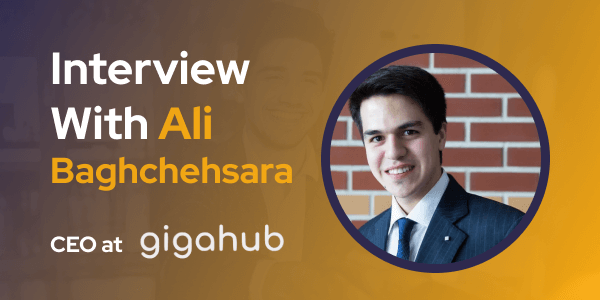Ali: We have closed 2 of our Global offices during the pandemic, which we re-opened after a while and then closed them again. We are currently planning a hybrid office strategy where people work mostly from home, but we take them to innovation camps on an island or ski resort, for a short period of time to work together and improve the synergies for several days.
So far with having e-coffee slots and other tools we have in place, we have managed to have rather efficient collaborations. But we do see there is an aspect of well-being related to not being present at an office, and an irregular work time, which we like to think open and stay Innovative to mitigate risks.
Check our interview section for more interviews with industry leaders!







Hi Ali, tell us about yourself and share some background about Gigahub (and how you ended up joining the company)
Ali: My name is Ali Baghchehsara, I am a sports pilot and professional skier. I have also worked my way up in the hierarchy of airbus at a pretty young age and left the company when I was in charge of Risk and Opportunity management for the entire aircraft cabin portfolio. My background is aerospace engineering and artificial intelligence, and I have been working on solving the problem of Predictive Maintenance for the past 5 years through my career. I also have done my Ph.D. at the crossing-section between predictive maintenance, Industrial use & cybersecurity.
I started the company as a spin-off of LISA Group, which is a government contractor building IT infrastructure and custom-built data lakes. I became a co-founder at Gigahub to essentially build a SaaS solution for predictive maintenance of Heavy Asset operators, especially for the Public Sector. We have seen throughout the pandemic, that prediction plays such an important role for the management of our infrastructure, country, and also aircraft. Our aim at Gigahub is to build a tool that with a predictive eye, you can really manage your staff, systems, and vehicles. This increases efficiency, reduces the manpower required to do a job, and at its utmost results to less unexpected failures.
Online commerce was booming in 2020; how did it affect Gigahub? – What are you going to focus on this year?
Ali: A 100%. We have never been luckier than last year, however we only made investments to secure our future better. At the start of pandemic and specific sectors, however, like the airline in sturdy, we had a drop, therefore we moved our focus and staff to Automotive and Military areas. I believe in 2020 what we have seen for digitalization is just a start. Start of an era with much more computation used, and artificial intelligence in place. Whoever doesn’t have a play in this won’t have a place in the very soon future – loses its competitive advantages.
Future is about operation efficiency, and predictive maintenance is the absolute importance of it. However many mistakes predictive maintenance for modular predictions. The major improvement of predictive maintenance happens only when you have achieved an entire level of integrity throughout the organization, have no single person working in silos, and ultimately work as one big entire team.
In this year our focus is going to be continuing what we have been doing. We are expanding massively in the U.S. Market, bidding on very interesting challenges to be solved through Small Business Innovation Research Contracts in order to solve problems of relevant institutions in different fields using predictive maintenance in the next 5-8 years.
The evolution of the big data industry
How much has the big data industry evolved in the last 2-3 years with the arrival of automation, customer experience, and data-driven insights?
Ali: The Big data industry in the last 2-3 years has made everyone aware of the need to do something about it. This was a necessary step-stone to realize many visions and understand the significance and impact that Big Data Industry can make. Automation at scale and customer data-driven insights are not yet as expensive as they will be in a span of 10-20 years. What we have seen within the industry in the last years is only a tiny tiny bit of what’s going to happen, in soon future. The future of Big Data will look different. Different in the sense that we are using automation and big data right now probably close to a fraction of a percent of its ultimate capability.
A lot of enablements are going to be realized once we have integrity. However unfortunately we see some governments like Germany which they have introduced destructive Data Privacy regulations that will only hinder them from the realization of big data capabilities. I guess fear is why. But no one wins the competition by deploying fear on its strategy. That is also why we have a bigger focus for next years in the United States than Europe.
Tell us about the CEO role in a pandemic crisis – what role digital transformation has in this crisis?
Ali: Being a CEO in a pandemic is like snowboarding in an avalanche situation. You need to continuously act, and act fast. Then you come out of it feeling proud!
As I am using the example of an avalanche in mountains, Digital transformation in a way is like an avalanche evolving in silence. There are a lot of snowballs being thrown here and there. But the real effect will only be seen and heard once the massive boom is to-be-heard very shortly afterward. I believe the COVID crisis impacts heavily digital transformation in a direct elation. In a way can be seen as an accelerator program for startups, just at scale and not seemingly Very relevant.
How is Gigahub changing the tech landscape?
Ali: We are changing the tech landscape by bringing integrity to industries and places that were not integrated! This requires a lot of different stakeholders to work together, essentially. But at the same time, this will be an enabler for doing prediction and running it at scale for those involved. Predicting how many customers they are going to get the next month, the next year, and how they should allocate their resources in advance. This is a game-changer for many, yet to come at scale and be valuable for the entire supply chain.
What makes Gigahub different from your direct competitors? And how is it different than legacy players in your space?
Ali: Our competitors have been pursuing to build the technology with legacy Information Systems. We are starting from the greenfield and we aim high. We also have a different pattern recognition system, and market implementation strategy, where we bring the very end-user or customer and plan our concepts to be easy to be used for them, and not the other way around. I believe a lot of our competitors are lacking the simplistic approach we have been taking to market.
Do you think working from home is good or bad for employee experience? How is Gigahub planning it’s office strategy in Post covid19 days?